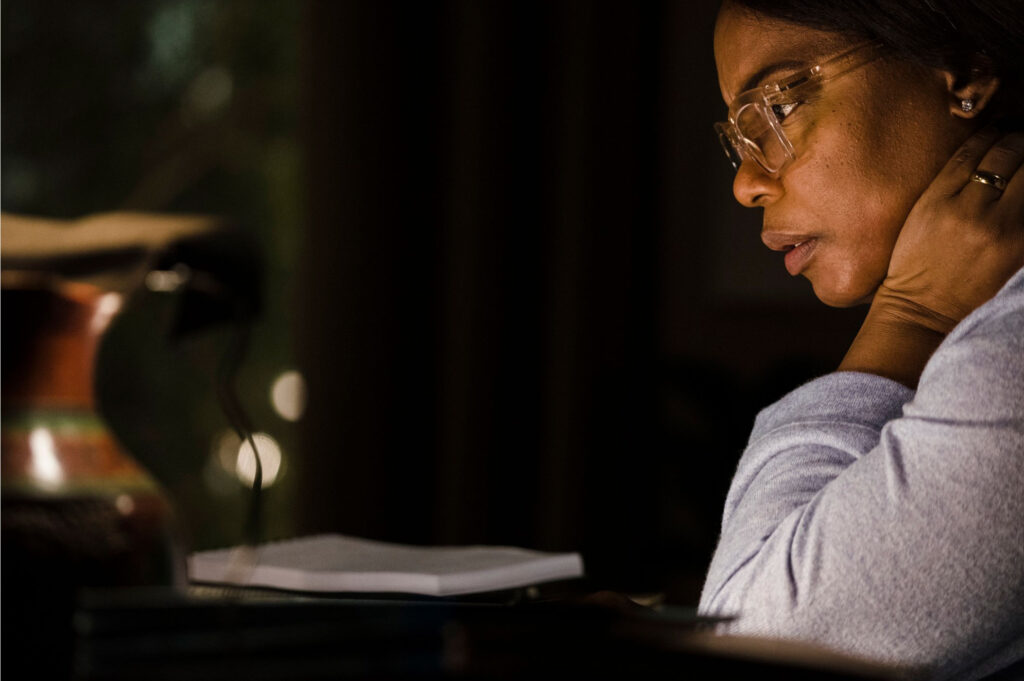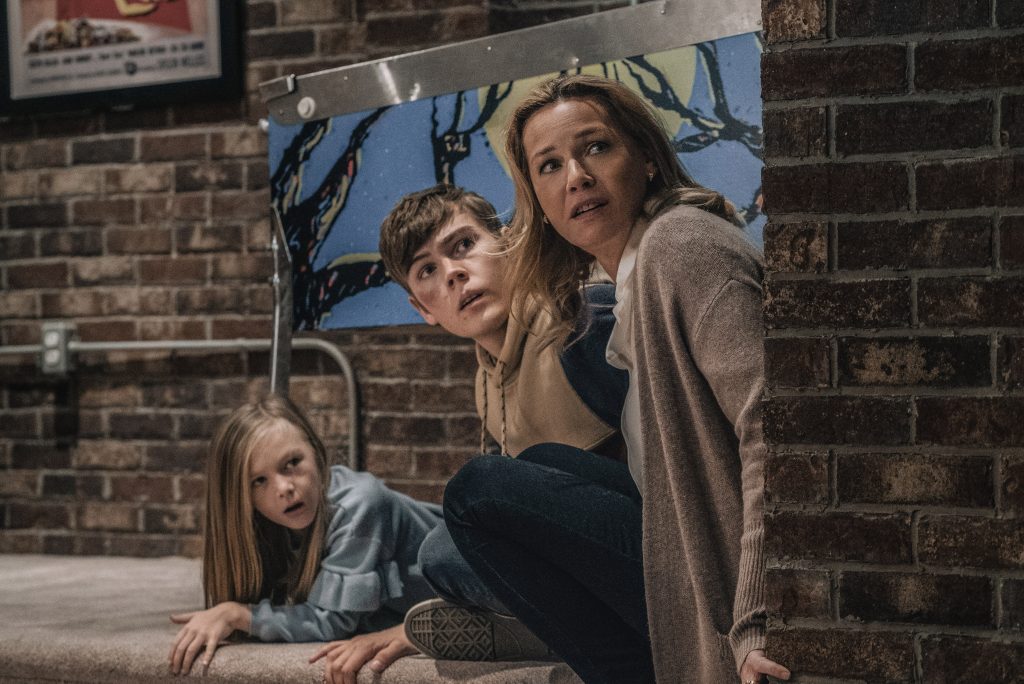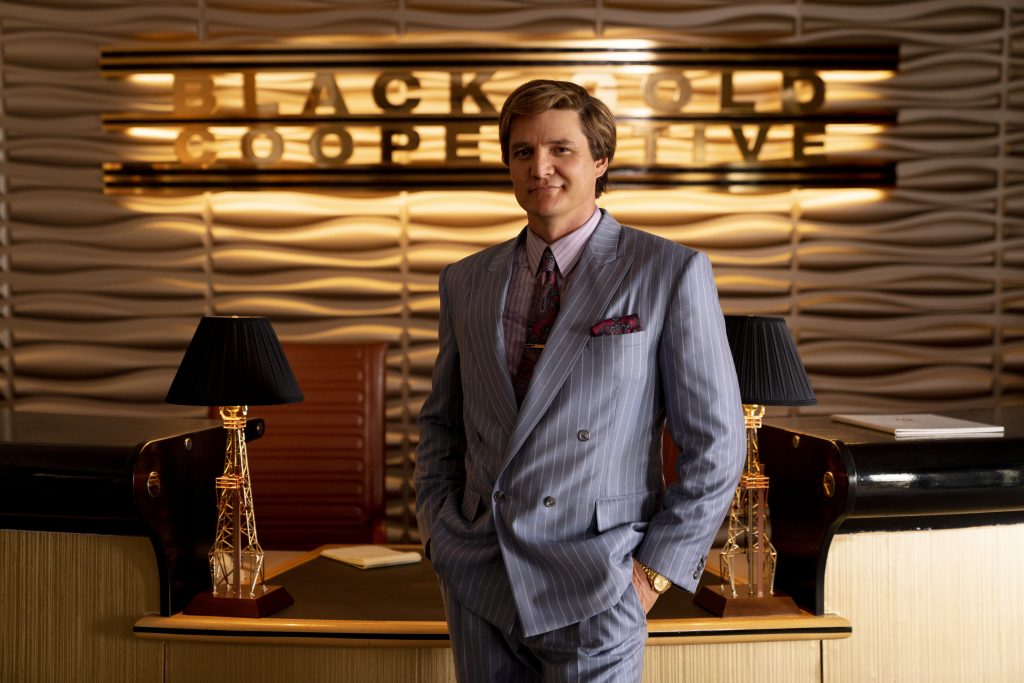December 10, 2023
by Carla Hay

Directed by Ava DuVernay
Some language in German and Hindi with subtitles
Culture Representation: Taking place in the United States, Germany, and India, the dramatic film “Origin” (based on the non-fiction book “Caste: The Origins of Our Discontents”) features an African American, white and Asian cast of characters representing the working-class and middle-class.
Culture Clash: After experiencing two major deaths in her family, a grieving non-fiction author decides to write a book investigating how societal prejudices around the world are interconnected through different forms of caste systems, even though some people are skeptical that this is a viable concept for a research book.
Culture Audience: “Origin” will appeal primarily to people who are fans of filmmaker Ava DuVernay and movies that take uncomfortable but necessary looks at how harmful societal prejudices come in many different forms but have the same goals of oppressing other people.

“Origin” weaves a meaningful cinematic tapestry that shows how societal prejudices are interconnected. The acting performances in this drama are admirable, but some viewers might think the movie’s pacing is too slow. “Origin” also presents multiple timeline-jumping storylines alongside the main story. This juggling of different stories in one movie might not appeal to everyone, with some viewers thinking that this narrative is too cluttered and messy. “Origin” (which had its world premiere at the 2023 Venice International Film Festival) is best appreciated by people who have the patience to watch a layered 135-minute movie with no distractions.
Written and directed by Ava DuVernay (who is one of the movie’s producers), “Origin” is based on American journalist-turned-author Isabel Wilkerson’s best-selling 2020 non-fiction book “Caste: The Origins of Our Discontents.” In the book, Pulitzer Prize-winning Wilkerson presents the theory that caste systems based on societal prejudices have caused various forms of damaging oppression around the world. In “Origin,” Wilkerson (played by Aunjanue Ellis-Taylor, also known as Aunjanue Ellis) is the movie’s main character, who researches this theory by using three main examples: racism in the United States, the Holocaust in Europe, and the caste system in India.
Racism in the United States includes scenes and mentions about the Trayon Martin tragedy of 2012, when 17-year-old Martin (who was unarmed) was shot and killed in Sanford, Florida, by a man who followed Martin and called 911 to report that Martin looked suspicious. (Myles Frost portrays Martin in “Origin.”) The killing of Martin is widely considered to be a flashpoint for the start of the Black Lives Matter movement.
At the time this tragedy occurred, Isabel is shown to be in a happy interracial marriage with her husband Brett Hamilton (played by Jon Bernthal), who is a mathematician and financial analyst. Isabel’s widowed mother Ruby Wilkerson (played by Emily Yancy), who uses a wheelchair, lives with Isabel and Brett. Isabel and Brett, who do not have children, have an upper-middle-class lifestyle where they go to parties attended by affluent and intellectual people. It’s at one of these parties where Isabel (a former newspaper journalist) is approached by her former editor Amari Selvan (played by Blair Underwood) to do a news article on the Martin tragedy, but she declines the request because she says she doesn’t want to be a journalist anymore.
Although things are going well in the marriage of Isabel and Brett, the spouses have to grapple with the difficult decision of putting Ruby in an assisted living facility when Ruby’s physical condition requires more medical attention than what Isabel and Brett can provide in their home. Isabel has a close emotional bond with Ruby, as well as with Isabel’s cousin Marion Wilkerson (played by Niecy Nash-Betts). Within a year, two of these family members will be dead.
A grieving Isabel then gets the idea to write “Caste” and goes on an international journey to do research for the book. (“Origin” was filmed in Germany, India, and the American cities of Montgomery in Alabama and Savannah in Georgia.) Ellis-Taylor gives a very good performance as the quietly determined Isabel, whose grief is not just on a personal level but also on a collective level for all the suffering and inhumanity that she has to report in her book.
While Isabel is on this research journey (she travels to Germany and India), “Origin” simultaneously shows stories that took place in the past. In 1930s Nazi-controlled Germany, African American husband-and-wife scholars Allison Davis (played by Isha Carlos Blaaker) and Elizabeth Davis (played by Jasmine Cephas Jones) experience racism when they are visiting in Berlin. The racist Germans whom Allison and Elizabeth encounter are openly hostile in their disbelief that black people can be well-educated and intelligent.
Meanwhile, a German shipyard worker named August Landmesser (played by Finn Wittrock), a gentile whose community is largely supportive of the Nazi antisemitic agenda, has to decide how he’s going to handle his secret romance with a Jewish woman named Irma Eckler (played by Victoria Pedretti), who wants to be more publicly open about their relationship. Allison and Elizabeth later team up with Harvard University anthropology spouses Burleigh Gardner (played by Matthew Zuk) and Mary Gardner (played by Hannah Pniewski) for an undercover social experiment that won’t be revealed in this review but is shown in the movie.
When Isabel is in India, she does deep-dive research into the caste system and learns more about the horrible treatment of Dalit people, who are considered the lowest of the low in India’s hierarchal society. Isabel also becomes familiar with the teachings of India’s former minister of law and justice Dr. Bhimrao Ramji Ambedkar, a controversial Dalit leader who fought for the civil rights of Dalit people. The parts of “Origin” that take place in India seem a little rushed in toward the end of the film.
The problem that some people might have with “Origin” is that it takes close to an hour into the movie before Isabel starts her research journey. The backstory about her family and the August/Irma romance fill up most of the first half of the film. “Origin” certainly could have used better film editing in this first half. For example, the movie really didn’t need to spend as much time as it did showing Isabel and Brett doing a search for an assisted living facility for Ruby.
A few notable actors have cameos in the parts of “Origin” that take place in the United States. Audra McDonald has the role of Miss Hale, one of the people who’s interviewed by Isabel for the book. Miss Hale shares vivid and painful memories of experiencing racism as a child.
Connie Nielsen has the role of Sabine, a German who meets Isabel in Germany, during a small dinner party at the home of their mutual friend Ulrich (played by John Hans Tester). Sabine is skeptical of Isabel’s theory that the Nazis in 1930s Germany used racial segregation and slavery laws from the United States as a blueprint for the Holocaust. Sabine thinks the book’s concept is flawed and doesn’t hesitate to tell Isabel her opinions. Sabine says that slavery in the United States was about “subjugation,” while the Holocaust in Europe was about “extermination.”
In an earlier scene, Nick Offerman has the role of a plumber named Dave, who visits Isabel’s home to fix a plumbing problem in her basement. Dave wears a Make America Great Again hat (a signature look of Donald Trump supporters), which is supposed to signal that he’s the type of politically conservative person who might clash with politically liberal Isabel. However, the conversation that Isabel and Dave have in the movie will surprise viewers who might be expecting some type of confrontation.
“Origin” takes a while to get to the heart of the story, but its approach to the subject matter should be admired for not being entirely predictable. Just like Wilkerson did in “Caste,” DuVernay wants viewers of “Origin” to understand that although certain laws exist that have banned slavery and genocide in certain countries that have been notorious for both, the toxic prejudices that fueled these horrors still exist in one form or another. By bringing together stories that take place in various time periods, “Origin” succeeds in its intention to show people a deeply moving film that exemplifies Spanish philosopher George Santayana’s famous quote about the pitfalls of forgetting what history has taught: “Those who cannot remember the past are condemned to repeat it.”
Neon released “Origin” in select U.S. cinemas on December 8, 2023, with a wider release in U.S. cinemas on January 19, 2024.




